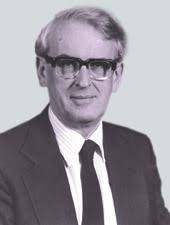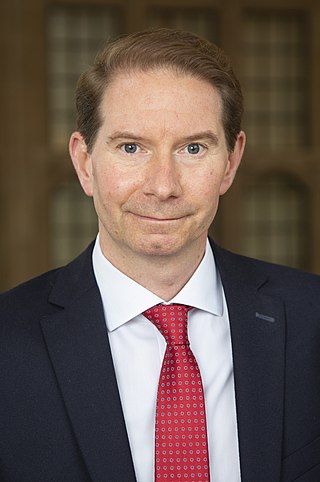Related Research Articles

Kevin Warwick is an English engineer and Deputy Vice-Chancellor (Research) at Coventry University. He is known for his studies on direct interfaces between computer systems and the human nervous system, and has also done research concerning robotics.

The Royal Institution of Great Britain is an organisation for scientific education and research, based in the City of Westminster. It was founded in 1799 by the leading British scientists of the age, including Henry Cavendish and its first president, George Finch. Its foundational principles were diffusing the knowledge of, and facilitating the general introduction of useful mechanical inventions and improvements, as well as enhancing the application of science to the common purposes of life.
A provost is a senior academic administrator. At many institutions of higher education, the provost is the chief academic officer, a role that may be combined with being deputy to the chief executive officer. In some institutions, they may be the chief executive officer of a university, of a branch campus of a university, or of a college within a university.

David Chilton Phillips, Baron Phillips of Ellesmere was a pioneering, British structural biologist and an influential figure in science and government.

Sushanta Kumar Bhattacharyya, Baron Bhattacharyya, was a British-Indian engineer, educator and government advisor. In 1980, he became Professor of Manufacturing Systems at the University of Warwick and founded the Warwick Manufacturing Group. In 2004, he was made a life peer and became a member of the House of Lords.
Peter Day, FRS, FRSC, FInstP was a British inorganic chemist and Professor of Chemistry at Oxford University and later at University College London (UCL).
Professor Dame Janet Patricia Beer, is a British academic who served as the Vice Chancellor of the University of Liverpool from February 2015 until December 2022. She took over from Howard Newby, having previously been Vice-Chancellor at Oxford Brookes University and Pro-Vice Chancellor Academic and Dean of Humanities, Law and Social Sciences at Manchester Metropolitan University.

Sir Anthony Kevin Cheetham is a British materials scientist. From 2012 to 2017 he was Vice-President and Treasurer of the Royal Society.

Benjamin John Eggleton,, is Pro Vice Chancellor (Research) at the University of Sydney. He is also Professor in the School of Physics where he leads a research group in integrated photonics, nonlinear optics and smart sensors and serves as co-director of the NSW Smart Sensing Network (NSSN).

Ian Hugh White is a British engineer. His previous roles include vice-chancellor of the University of Bath, Master of Jesus College, Cambridge, deputy vice chancellor of the University of Cambridge, van Eck Professor of Engineering, and head of the Photonic Research Group, comprising CMMPE, Centre for Photonic Systems, and Photonics and Sensors, in the Cambridge University Engineering Department.
Lionel Michael Whitby is a British ancient historian of Late Antiquity. He specialises in late Roman and early Byzantine history and historiography. He is currently pro-vice-chancellor and head of the College of Arts and Law at the University of Birmingham.

Professor Jennifer Louise "Jenny" Martin is an Australian scientist and academic. She was the Deputy Vice-Chancellor at the University of Wollongong, in New South Wales from 2019-2022. She is a former director of the Griffith Institute for Drug Discovery at Griffith University. and a former Australian Research Council Laureate Fellow at the Institute for Molecular Bioscience, University of Queensland. Martin is Professor Emerita at the University of Queensland and adjunct professor at Griffith University. Her research expertise encompasses structural biology, protein crystallography, protein interactions and their applications in drug design and discovery.
Koenraad Lamberts is a British/Belgian psychologist and academic. Since 2018, he has served as President and Vice-Chancellor of the University of Sheffield. From 2014 to 2018, he was the Vice-Chancellor of the University of York. Previously, he had taught at the University of Chicago, University of Birmingham, and the University of Warwick. Lamberts was chair of UCAS between 2019 and 2020. During his time at Sheffield, Lamberts oversaw the closure of its "world-renowned archaeology department".
Mark Edmund Smith, is a British physicist, academic, and academic administrator. He specialises in nuclear magnetic resonance (NMR) and materials physics. Since October 2019, he has been the President and Vice-Chancellor of University of Southampton, having previously held the office of Vice-Chancellor of Lancaster University, and Professor of Solid State NMR in its Department of Chemistry since 2012. He has previously lectured at the University of Kent and the University of Warwick.
Simon Charles Robert Swain, FBA, is a classicist and academic. Since 2000, he has been Professor of Classics at the University of Warwick, where he has also been Pro-Vice-Chancellor for Arts and Social Sciences since 2014.
Laura Elizabeth Green is a British epidemiologist and academic who is Pro-vice-chancellor and Head of the College of Life and Environmental Sciences at the University of Birmingham. She serves on the council of the Biotechnology and Biological Sciences Research Council (BBSRC).
The Faraday Institution is the United Kingdom's research institute aiming to advance battery science and technology. It was established in 2017 as part of the UK's wider Faraday Battery Challenge. It states its mission as having four key areas: "electrochemical energy storage research, skills development, market analysis and early-stage commercialisation". The Institution is headquartered at the Harwell Science and Innovation Campus near Oxford. It is a limited company and is a registered charity with an independent board of trustees.

Stephen A. Jarvis is a British computer scientist and academic administrator. He is currently Provost and Vice-Principal at the University of Birmingham. Prior to this he served as pro-vice-chancellor at the university and head of its College of Engineering and Physical Sciences.

Alexei Vasilievich Shubnikov was a Soviet crystallographer and mathematician. Shubnikov was the founding director of the Institute of Crystallography of the Academy of Sciences of the Soviet Union in Moscow. Shubnikov pioneered Russian crystallography and its application.
John Ballato is an American materials scientist, entrepreneur, and academic. He holds the J. E. Sirrine Endowed Chair of Optical Fiber and is a professor of materials science and engineering, electrical and computer engineering, as well as physics and astronomy at Clemson University. He has received many international recognitions for his research on optical and optoelectronic materials, particularly as relates to optical fiber.
References
- ↑ "Prof. Pam A. Thomas".
- ↑ "Ferroelectrics Group, University of Warwick".
- ↑ "Ferroelectrics & Crystallography Group, University of Warwick" . Retrieved 7 March 2020.
- ↑ "Pam Thomas Appointed Chief Executive of Faraday Institution". The Faraday Institution. 24 September 2020.
- ↑ "'Optical activity in crystals', P. A. Thomas, DPhil Thesis, University of Oxford".
- ↑ "Prizes of the Physical Crystallography Group, British Crystallography Association".
- ↑ "New Director for Science City Research Alliance".
- ↑ "Science City Research Alliance". University of Warwick. Retrieved 7 March 2020.
- ↑ "Science City Research Alliance Hosts Discovery Day". University of Birmingham. 7 January 2011.
- ↑ "University of Warwick - REF 2014 results". Research Excellence Framework. Retrieved 7 March 2020.
- ↑ "New Faculty Chairs 2011: Professor Pam Thomas and Professor Simon Swain".
- ↑ "Research at the University of Warwick" . Retrieved 7 March 2020.
- ↑ "Appointment of Pro-Vice-Chancellors, University of Warwick".
- ↑ "BOARD OF TRUSTEES" . Retrieved 7 March 2020.
- ↑ "Professor Stephen Jarvis appointed to the Turing's Board of Trustees".
- ↑ "Realising the potential: Final report of the Open Research Data Task Force" (PDF). Retrieved 7 March 2020.
- ↑ "UKRI welcomes publication of open research reports" . Retrieved 7 March 2020.
- ↑ "Open Research Data Task Force: final report" . Retrieved 7 March 2020.